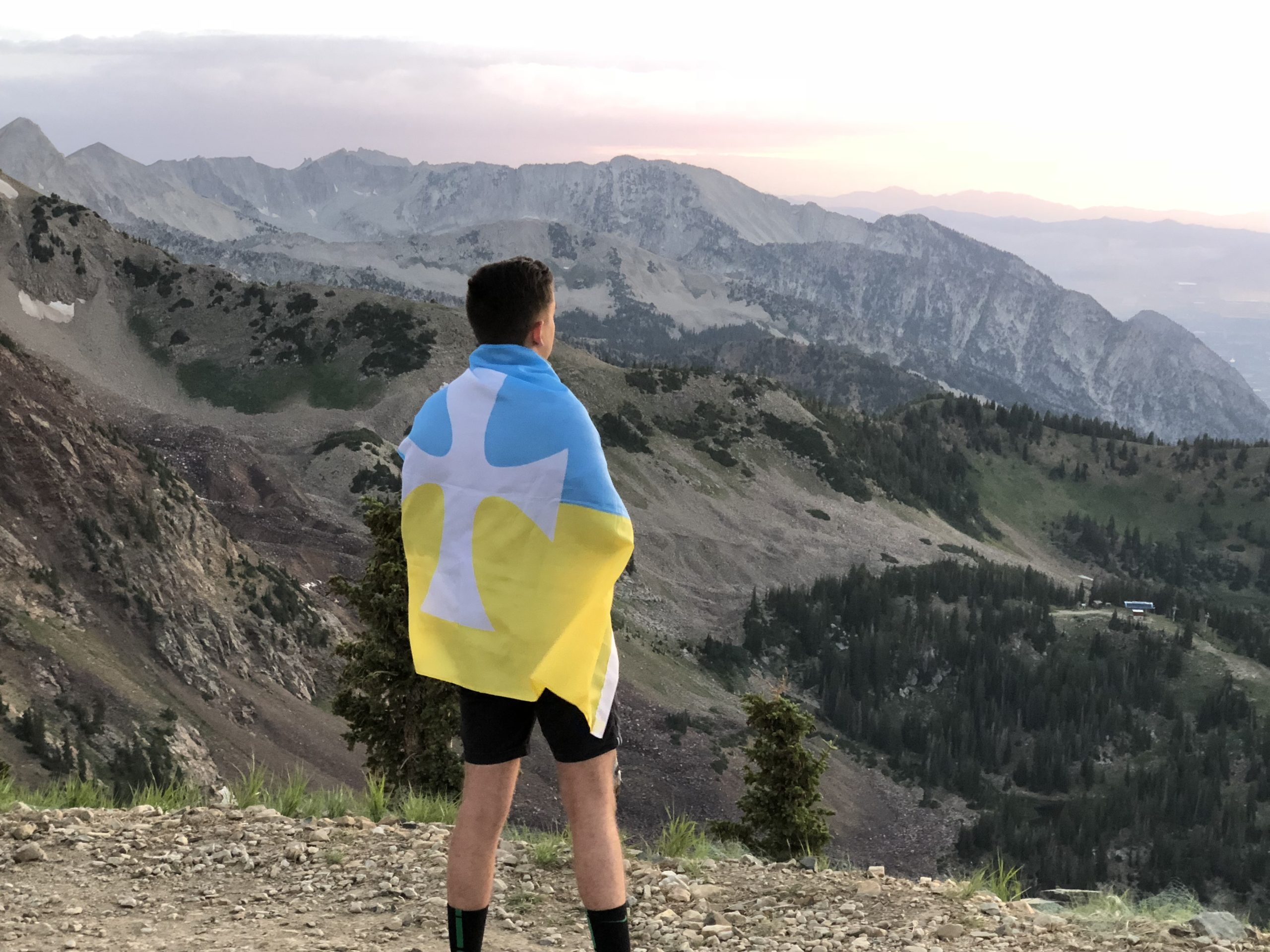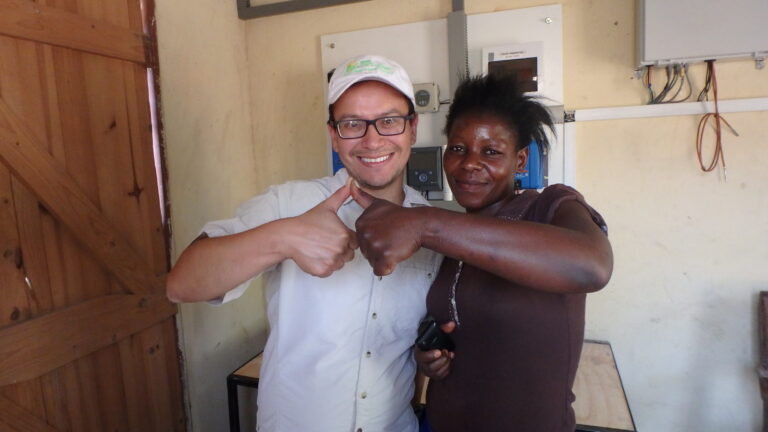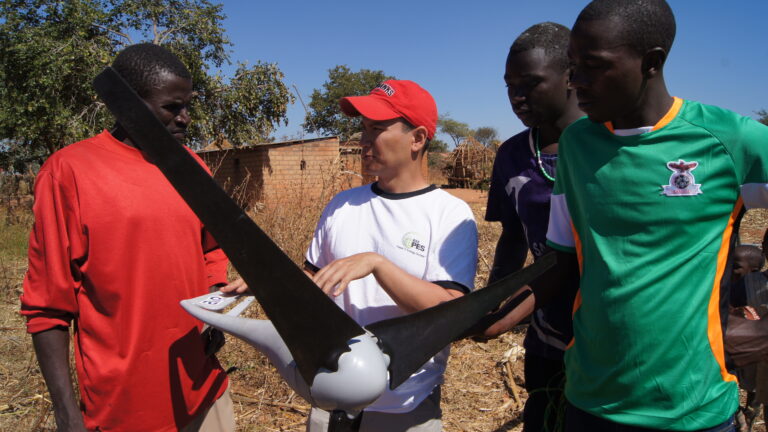Fraternity
- 1714 Hinman Ave. Evanston, IL 60201
- headquarters@sigmachi.org
- Directory

BY ASHLEY SZATALA
Henry Louie, KETTERING 2002, co-founded KiloWatts for Humanity, which helps electrify communities in developing countries to create businesses that benefit residents

Henry Louie, KETTERING 2002, studied power engineering, a subfield of electrical engineering, throughout his undergraduate and post-graduate schooling. However, it wasn’t until he earned his doctoral degree and started teaching at Seattle University (SU) in 2008 that he learned a huge segment of the global population doesn’t have access to electricity. In 2016, the most recent year for which data is available, the International Energy Agency reported that 940 million people worldwide lacked access.
SU is a Jesuit university, and staff are encouraged to explore how their expertise intersects with humanity at the most basic level. In his first year at SU, Louie worked with students to design a simple hand-cranked generator that people in rural areas without electricity could use.
“I traveled to Zambia for the first time and was mentored on the basics of appropriate design and humanitarian engineering,” he says. “I was hooked. It was important to me to apply my expertise in a way that directly helped people.”
That initial experience of providing electricity in Sub-Saharan Africa helped inspire Louie to co-found KiloWatts for Humanity in 2015. The nonprofit organization provides renewable energy solutions in less-economically developed communities; in turn, the access to electricity fosters the development of businesses. For his work with KiloWatts for Humanity, Louie has been named the summer quarter Mark V. Anderson Character-in-ActionTM Leadership Award recipient.
Life Without Electricity
Louie says it’s difficult for those with reliable electricity to imagine what life is like without it.
“Your day starts at sunrise and ends at sunset. There’s no evening time to work or socialize. Without electricity, simple tasks are much more difficult,” he explains. “You can’t pump water. You don’t feel safe walking outside in the dark or in your own home. You don’t have a radio to be informed. You have no idea what your president looks like. You have limited access to entertainment and communication. You spend a large portion of your money on using primitive fuels like wood, dried dung or candles for lighting and heat.”
Louie experienced the situation, called energy poverty, firsthand when he was selected as a Fulbright Scholar in 2015. He lived in Zambia for a year, taught at Copperbelt University in Kitwe and worked to bring solar-powered electricity to rural communities.
“The country was experiencing load shedding, which meant that for eight hours each day, people, even those of us living in large cities, did not have electricity,” Louie says. “I ended up forming a research group to explore how this lack of electricity impacted how people lived — switching to using charcoal to cook, candles for light, buying smaller quantities of food because refrigerators were unable to keep food cold, etc.”
Also in 2015, Louie, faculty and staff at SU and volunteers had begun taking on increasingly ambitious electrification projects in developing countries and decided to form a nonprofit, KiloWatts for Humanity, to continue their work.

Powering Communities and Businesses
KiloWatts for Humanity partners with local nonprofit organizations to identify communities in need and install microgrids, or energy kiosks, that are typically powered by solar or wind energy. The technical, economic, environmental and social aspects of a community are all considered, Louie says, adding that local nonprofit partners are essential because they know the communities, customs and people. After identifying possible communities in need, surveys and data are collected to see if the services provided by a microgrid system align with the needs of the community and if the community can support it.
“We take a community-powered, sustainable approach to solving energy poverty. The community where the [energy] kiosk is installed is empowered to determine what their needs and ideas are for creating a sustainable, revenue-generating business, or businesses, that will benefit the whole community,” says Jenna Isakson, a co-founder of KiloWatts for Humanity. “By creating sustainable businesses, our [local] partner and the community can maintain the microgrid for years to come and ideally continue to expand their services to meet more of the community’s needs.”
KiloWatts for Humanity has done several projects in Zambia as well as in Kenya and the Philippines. For example, in Chalokwa, Zambia, volunteers installed solar panels to provide localized air conditioning, and the energy kiosk the panels power serves as a grocery store for the community and charges a laptop used by the local primary school. In Cheeba, Zambia, solar panels power an energy kiosk that provides electricity for freezers, mobile phone and battery charging, a barbershop and a small grocery store. Up next for KiloWatts for Humanity is working to electrify the drought-stricken village of Kanchomba, Zambia.
I actually keep a copy of The Norman Shield in my office. I served as Magister and then Pro Consul at my chapter. I credit my time as Magister with solidifying my goal to be a professor. I loved learning and loved teaching. Through Sigma Chi, I was exposed to volunteerism and service. I gained valuable leadership experience that translates well into leading a volunteer-based organization.
Henry Louie
Louie says people’s reaction to having electricity is indescribable.
“It is always a big occasion. People will often say that they feel modern now that they have light at home. In some villages, they put on large community events to celebrate the opening of the system, such as dancing, food and drink,” he says. “Coming back to visit a community at night and seeing electric light where there was none before is an amazing feeling. I struggle to describe it with words.”
Isakson says Louie’s passion for tackling energy poverty and the community of students and volunteers he has drawn to this cause is what initially drew Isakson to getting involved with KiloWatts for Humanity nearly seven years ago.
“He is so knowledgeable on the topic, the solutions, and speaks about it with such animation and urgency that he motivates me, and so many of our volunteers, to continuing doing just that — volunteering to end energy poverty,” she says. “Henry is an inspiring educator and leader. He puts in many hours throughout the year to see these off-grid solar microgrids come to fruition and to inspire the next generation of leaders to use their expertise for social good.”
Louie credits Sigma Chi as helping mold the leader and volunteer he is today.
“I actually keep a copy of The Norman Shield in my office. I served as Magister and then Pro Consul at my chapter. I credit my time as Magister with solidifying my goal to be a professor. I loved learning and loved teaching,” he says. “Through Sigma Chi, I was exposed to volunteerism and service. I gained valuable leadership experience that translates well into leading a volunteer-based organization.”
A person with good character shows trustworthiness, respect and fairness to others, as well as responsibility and citizenship. Those members who go out of their way to help others and those who overcome obstacles and lead with integrity are good candidates for the Mark V. Anderson Character-in-ActionTM Leadership Award.
Sigma Chi introduced the award to recognize the selfless acts of brothers. A formal recognition by the Fraternity allows non-members to appreciate the scope of the organization. For information about the award, see sigmachi.org/character.